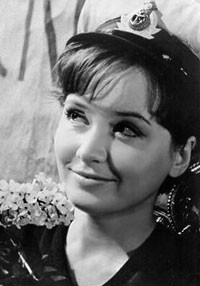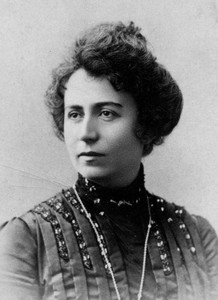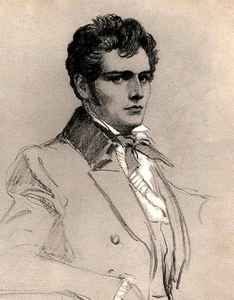
Tatiana Shmyga (Tatiana Shmyga).
Tatiana Shmyga

An operetta artist must be a generalist. Such are the laws of the genre: it combines singing, dance and dramatic acting on an equal footing. And the absence of one of these qualities is in no way compensated for by the presence of the other. This is probably why the true stars on the horizon of the operetta light up extremely rarely. Tatyana Shmyga is the owner of a peculiar, one might say synthetic, talent. Sincerity, deep sincerity, soulful lyricism, combined with energy and charm, immediately attracted attention to the singer.
Tatyana Ivanovna Shmyga was born on December 31, 1928 in Moscow. “My parents were very kind and decent people,” the artist recalls. “And I know from childhood that neither mother nor father could ever not only take revenge on a person, but even offend him.”
After graduation, Tatyana went to study at the State Institute of Theater Arts. Equally successful were her classes in the vocal class of D.B. Belyavskaya; was proud of his student and I.M. Tumanov, under whose guidance she mastered the secrets of acting. All this left no doubts about the choice of a creative future.
“… In my fourth year, I had a breakdown – my voice disappeared,” says the artist. “I thought I would never be able to sing again. I even wanted to leave the institute. My wonderful teachers helped me – they made me believe in myself, find my voice again.
After graduating from the institute, Tatyana made her debut on the stage of the Moscow Operetta Theater in the same year, 1953. She started here with the role of Violetta in Kalman’s Violet of Montmartre. One of the articles about Shmyg rightly says that this role “as if predetermined the theme of the actress, her special interest in the fate of simple, modest, outwardly unremarkable young girls, miraculously transforming in the course of events and showing special moral stamina, courage of the soul.”
Shmyga found both a great mentor and a husband in the theater. Vladimir Arkadyevich Kandelaki, who then headed the Moscow Operetta Theater, turned out to be one in two persons. The warehouse of his artistic talent is close to the artistic aspirations of the young actress. Kandelaki correctly felt and managed to reveal the synthetic abilities with which Shmyga came to the theater.
“I can say that those ten years when my husband was the main director were the most difficult for me,” Shmyga recalls. – I couldn’t do it all. It was impossible to get sick, it was impossible to refuse the role, it was impossible to choose, and precisely because I am the wife of the main director. I played everything, whether I liked it or didn’t like it. While the actresses were playing the Circus Princess, the Merry Widow, Maritza and Silva, I replayed all the roles in the “Soviet operettas”. And even when I didn’t like the proposed material, I still started rehearsing, because Kandelaki told me: “No, you will play it.” And I played.
I don’t want to give the impression that Vladimir Arkadyevich was such a despot, kept his wife in a black body … After all, that time was the most interesting for me. It was under Kandelaki that I played Violetta in The Violet of Montmartre, Chanita, Gloria Rosetta in the play The Circus Lights the Lights.
These were wonderful roles, interesting performances. I am very grateful to him for the fact that he believed in my strength, gave me the opportunity to open up.
As Shmyga said, the Soviet operetta has always remained at the center of her repertoire and creative interests. Almost all the best works of this genre have recently passed with her participation: “White Acacia” by I. Dunaevsky, “Moscow, Cheryomushki” by D. Shostakovich, “Spring Sings” by D. Kabalevsky, “Chanita’s Kiss”, “The Circus Lights the Lights”, “Girl’s Trouble” by Y. Milyutin, “Sevastopol Waltz” by K. Listov, “Girl with Blue Eyes” by V. Muradeli, “Beauty Contest” by A. Dolukhanyan, “White Night” by T. Khrennikov, “Let the Guitar Play” by O. Feltsman , “Comrade Love” by V. Ivanov, “Frantic Gascon” by K. Karaev. This is such an impressive list. Completely different characters, and for each Shmyga he finds convincing colors, sometimes overcoming the conventionality and looseness of the dramatic material.
In the role of Gloria Rosetta, the singer rose to the heights of skill, creating a kind of standard of performing art. That was one of the last works of Kandelaki.
E.I. Falkovic writes:
“… When Tatyana Shmyga, with her lyrical charm, impeccable taste, turned out to be at the center of this system, the flashiness of Kandelaki’s manner was balanced, she was given richness, the thick oil of his writing was set off by the gentle watercolor of Shmyga’s playing.
So it was in the Circus. With Gloria Rosetta – Shmyga, the theme of the dream of happiness, the theme of spiritual tenderness, charming femininity, the unity of external and internal beauty, was included in the performance. Shmyga ennobled the noisy performance, gave it a soft shade, emphasized its lyrical line. In addition, by this time her professionalism had reached such a high level that her performing arts became a model for partners.
The life of young Gloria was hard – Shmyga bitterly talks about the fate of a little girl from the Parisian suburbs, left an orphan and adopted by an Italian, the owner of the circus, rude and narrow-minded Rosetta.
It turns out that Gloria is French. She is like the older sister of the Girl from Montmartre. Her gentle appearance, the soft, slightly sad light of her eyes evoke the type of women that poets sang about, who inspired artists – the women of Manet, Renoir and Modigliani. This type of woman, tender and sweet, with a soul full of hidden emotions, creates Shmyg in her art.
The second part of the duet – “You burst into my life like the wind …” – an impulse for frankness, a competition of two temperaments, a victory in a soft, soothed lyrical solitude.
And suddenly, it would seem, a completely unexpected “passage” – the famous song “The Twelve Musicians”, which later became one of Shmyga’s best concert numbers. Bright, cheerful, in the rhythm of a fast foxtrot with a whirling chorus – “la-la-la-la” – an unpretentious song about twelve unrecognized talents who fell in love with a beauty and sang their serenades to her, but she, as usual, loved a completely different, poor the seller of notes, “la-la-la-la, la-la-la-la …”.
… A swift exit along a diagonal platform descending to the center, a sharp and feminine plasticity of the dance that accompanies the song, an emphatically pop costume, a cheerful enthusiasm for the story of a charming little trickster, devoting oneself to a captivating rhythm …
… In “The Twelve Musicians” Shmyga achieved an exemplary variety performance of the number, the uncomplicated content was cast into an impeccable virtuoso form. And although her Gloria does not dance cancan, but something like a complex stage foxtrot, you remember both the French origin of the heroine and Offenbach.
With all that, there is a certain new sign of the times in her performance – a portion of light irony over a stormy outpouring of feelings, irony that sets off these open feelings.
Later, this irony is destined to develop into a protective mask against the vulgarity of worldly fuss – with this, Shmyga will again reveal his spiritual closeness with serious art. In the meantime – a slight veil of irony convinces that no, not everything is given to a brilliant number – it’s ridiculous to think that a soul, thirsting to live deeply and fully, is able to be satisfied with a lovely song. It’s cute, fun, funny, extraordinarily beautiful, but other forces and other purposes are not forgotten behind this.
In 1962, Shmyga first appeared in films. In Ryazanov’s “Hussar Ballad” Tatyana played an episodic, but memorable role of the French actress Germont, who came to Russia on tour and got stuck “in the snow”, in the thick of the war. Shmyga played a sweet, charming and flirtatious woman. But these eyes, this tender face in moments of solitude do not hide the sadness of knowledge, the sadness of loneliness.
In Germont’s song “I keep drinking and drinking, I’ve already become drunk …” you can easily notice the trembling and sadness in your voice behind the seeming fun. In a small role, Shmyga created an elegant psychological study. The actress used this experience in subsequent theatrical roles.
“Her game is marked by an impeccable sense of the genre and deep spiritual fulfillment,” notes E.I. Falkovich. — The indisputable merit of the actress is that with her art she brings depth of content to the operetta, significant life problems, raising this genre to the level of the most serious ones.
In each new role, Shmyga finds fresh means of musical expression, striking with a variety of subtle life observations and generalizations. The fate of Mary Eve from the operetta “The Girl with Blue Eyes” by V.I. Muradeli is dramatic, but told in the language of a romantic operetta; Jackdaw from the play “Real Man” by M.P. Ziva attracts with the charm of outwardly fragile, but energetic youth; Daria Lanskaya (“White Night” by T.N. Khrennikov) reveals the features of genuine drama. And, finally, Galya Smirnova from the operetta “Beauty Contest” by A.P. Dolukhanyan sums up the new period of searches and discoveries of the actress, who embodies in her heroine the ideal of the Soviet man, his spiritual beauty, richness of feelings and thoughts. In this role, T. Shmyga convinces not only with his brilliant professionalism, but also with his noble ethical, civil position.
Significant creative achievements of Tatiana Shmyga in the field of classical operetta. The poetic Violetta in The Violet of Montmartre by I. Kalman, the lively, energetic Adele in The Bat by I. Strauss, the charming Angele Didier in The Count of Luxembourg by F. Lehar, the brilliant Ninon in the victorious stage version of The Violets of Montmartre, Eliza Doolittle in “My Fair Lady” by F. Low – this list will certainly be continued by the new works of the actress.
In the 90s, Shmyga played the main roles in the performances “Catherine” and “Julia Lambert”. Both operettas were written especially for her. “The theater is my home,” Julia sings. And the listener understands that Julia and the performer of this role Shmyga have one thing in common – they cannot imagine their life without the theater. Both performances are a hymn to the actress, a hymn to a woman, a hymn to female beauty and talent.
“I have worked all my life. For many years, every day, from ten in the morning rehearsals, almost every evening – performances. Now I have the opportunity to choose. I play Catherine and Julia and I don’t want to play other roles. But these are performances for which I am not ashamed,” says Shmyga.





